Seven people enter a race. There are 4 types of medals given as prizes for completing the race. The winner gets a platinum medal, the runner - up gets a gold medal, the next two racers each get a silver metal, and the last 3 racers all get bronze medals. What is the number of different ways the medals can be awarded?
The correct Answer is:420
Step by step video, text & image solution for Seven people enter a race. There are 4 types of medals given as prizes for completing the race. The winner gets a platinum medal, the runner - up gets a gold medal, the next two racers each get a silver metal, and the last 3 racers all get bronze medals. What is the number of different ways the medals can be awarded? by Maths experts to help you in doubts & scoring excellent marks in Class 12 exams.
Similar Questions
Eight athletes compete in a race in which a gold, a silver and a bronze medal will be awarded to the top three finishers, in that order.
Quantity AQuantity BThe number of ways in which8×3!the medals can be awardedView SolutionFind the number of ways in which 22 different books can be given to 5 students, so that two students get 5 books each and all the remaining students get 4 books each.
View Solution
Knowledge Check
- Question 1 - Select One
At this moment in America the aspects of political society absorb attention. In every house, form canda to the gulf, the children ask the serious father, -" What is the news of the war today and when will there be better times? The boys have no new clothers, no gifts, no juo0urneys, the girls must go without new bonnets, boys and girls find their education, this year, less liberal and complete. All the little hopes that heretofore made the year pleasant are deferred. the state of the country fills us with anxiety and stern duties. We have attempted to hold together two states of civilzation, a higher state, where labor and the tenure of land and the right of suffrage are democratical, and a lower state, in which the old military tenure of prisoners or slaves and of power and land in a few hands, makes an oligarchy, we have attempted to hold these two states of society under one law. But the rude and early state of society does not work well with the later nay, works badly and has poisoned politics, public morals and social intercourse in the Republic now for many years. the times put this question, Why cannot the best civilzation be extended over the whole country, since the disorder of the less civilization be extended over the whole country, since the disorder of the less civilized portion menaces the existence of the country Is this secular progres we have described, this evolution of man to the highest powers, only to giv ehim sensibility, and not to bring duties with it is he not to make his knowledge practical to stand and to withstand Is not civilzation heroic also is it not for action has it not a will america is another word for opportunity. Our whole history appears lke a last effort of the Divine providence onbehalf of the human race, and a literal slavish following of precedents, as by a justice of the peace, is not for those who at this hour lead te destinies of this people. the evil you contend with has taken alarmig proportions, and you still content yourself with parrying the blows it aims, but, as if enchanted abstain from striking at the cause. {..} Emancipation is the demand of civilization. That is a principle, everything else is an intrigue. This ais a progressive policy, puts the whole people in healthy, productive, amiable position, puts every man in the south in just and natural relations with every man in the north, laborer with laborer. the power of Emancipation is this, that if alters the atomic social constitution of the Southern people. Now their interest is in keeping out white labor, then, when they must pay wages, their interest wil by to let it in , to get the best labor, and , if they fear their lbacks, to inite irish, German and american laborers. Thus, whilst slavery makes and keeps disunion, emancipation removes the whole objection to union. Emancipation at one stroke elevates the poor white of the south, and identifies his interest with that of the northern laborer. [..] The end of all political struggle is to establish morlity as the basis of all legislation. It is not free institutions, tis not a epublic, tis not a democracy, that is the end, no, but only the means. Morality is the object of government. We want a state of things in which crime shall not pay . This is the consolation on which we rest in the darness of the future and the afflictions of today, that the government of the world is moral, and does forever destroy what is not.
(Q) 37. What is the purpose tof the question in lines 26-36?ATo rhetorically emphasize a need for actionBTo encourage raders intellectual curiosityCTo critique the reasoning given in the previous paragraphDTo summarize the thoughts of Emerson's mentor - Question 2 - Select One
The 'wisdom of crowds" has become a mantra of the Internet age. Need to choose a new vacuum cleaner? Check out the reviews on online merchant Line Amazon. But a new study suggests that such online s scores don't always reveal the best choice. A massive controlled experiment of Web users finds that such ratings are highly susceptible to irrational "herd behavior' —and that the herd can be manipulated. Sometimes the crowd really is wiser than you. The to classic examples are guessing the weight of a bull or the number of gumballs in a jar. Your guess is probably going to be far from the mark, whereas the average of many people's choices is remarkably close to the true number. 15 But what happens when the goal is to judge something less tangible, such as the quality or worth of a product? According to one the, the wisdom of the crowd still holds—measuring ihe aggregate of people's opinions produces a stable, reliable 20 value, Skeptics, however, argue that people's opinions are easily swayed by those of others. So nudging a crowd early on by presenting contrary opinions—for example, exposing them to some very good or very bad attitudes—will steer the crowd in a 15 different direction. To test which hypothesis is true, you would need to manipulate huge numbers of people, exposing them to false information and determining how it affects their opinions. A team led b-y Sinan Aral, a network scientist at 30 the Massachusetts institute .of Technology in Cambridge, did exactly t lee Aral has been secretly . working with a popular website that aggregates news stories. The website allows users to make comments about news stories and vote each other's comments 55 up or down. The vote tallies ale visible as a number next to each comment , and the position of the comments is chronological. (Stories on the site get an average of about ten comments and about three votes per comment.)It’s a follow-up to his experiment using people’sratings of movies to measure how much individual people influence each other online (answer:alot).This time,he wanted to know how much the crowd influences the individual,and whether it can be controlled from outside.
For five months,every comment submitted by a user randomly received an“up”vote(positive),a “down”vote(negative),or as a control,no vote at all The team then observes! how users rated those comments. The users generated more than so 100,000 comments that were viewed more than 10 million times and rated more than 300,000 times by other users.
At least when it comes to comments on news sites, the crowd is more herdlike than wise. 55 Comments that received fake positive votes from the researchers were 32% more Likely to receive more positive votes compared with a control, the team reports. And those comments were no more likely than the control to be down-voted by the next viewer 60 to see them. By the end of the study, positively manipulated comments got an overall boost of about 25%. However, the same did not hold true for negative manipulation. The ratings of comments that got a fake down vote were usually negated by an up vote by the next user to see them. "Our experiment does not reveal the psychology behind people's decisions," Aral says, "but an intuitive explanation is that people are more skeptical of negative social influence. They're more 70 willing to go along with positive opinions from other people." - • -Duncan Watts, a network scientist at Microsoft Research in New York City, agrees with that conclusion. But] one question is whether the 75 positive 'herding] bias is specific to this site" or true in general, Watts says. lie points out that the category of the news items in the experiment had a strong effect on how much people could be manipulated. "I would have thought that 'business' is so pretty similar to 'economics,' yet they find a much stronger effect (almost 50% stronger) for the former • than the latter. What explains this difference? If we're going to apply these findings in the real world, we'll need to know the answers.Will companies be able to boost their products by manipulating online ratings on a massive scale? “That is easier said than done,”Wattssays.If people detect—or learn—that comments on a website are being manipulated,the herd may spook and leave entirely.
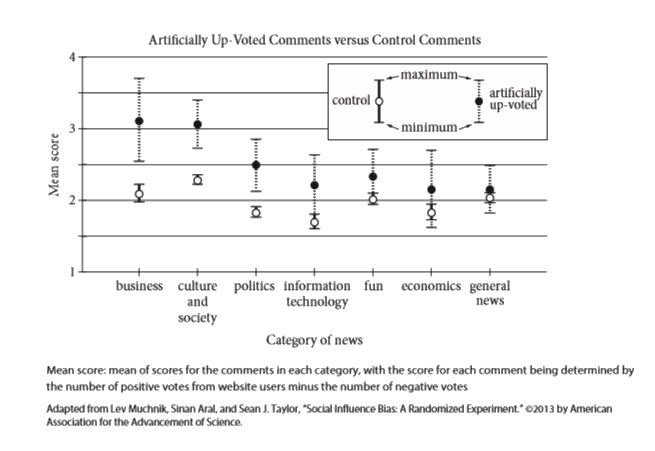
Over the course of the passage, the main focus shifts from a discussion of an experiment and its results toAan explanation of the practical applications of the resultsBa consideration of the questions prompted by the resultsCananalysis of the defects undermining the results.Da conversation with a scientist who disputes the results - Question 3 - Select One
The 'wisdom of crowds" has become a mantra of the Internet age. Need to choose a new vacuum cleaner? Check out the reviews on online merchant Line Amazon. But a new study suggests that such online s scores don't always reveal the best choice. A massive controlled experiment of Web users finds that such ratings are highly susceptible to irrational "herd behavior' —and that the herd can be manipulated. Sometimes the crowd really is wiser than you. The to classic examples are guessing the weight of a bull or the number of gumballs in a jar. Your guess is probably going to be far from the mark, whereas the average of many people's choices is remarkably close to the true number. 15 But what happens when the goal is to judge something less tangible, such as the quality or worth of a product? According to one the, the wisdom of the crowd still holds—measuring ihe aggregate of people's opinions produces a stable, reliable 20 value, Skeptics, however, argue that people's opinions are easily swayed by those of others. So nudging a crowd early on by presenting contrary opinions—for example, exposing them to some very good or very bad attitudes—will steer the crowd in a 15 different direction. To test which hypothesis is true, you would need to manipulate huge numbers of people, exposing them to false information and determining how it affects their opinions. A team led b-y Sinan Aral, a network scientist at 30 the Massachusetts institute .of Technology in Cambridge, did exactly t lee Aral has been secretly . working with a popular website that aggregates news stories. The website allows users to make comments about news stories and vote each other's comments 55 up or down. The vote tallies ale visible as a number next to each comment , and the position of the comments is chronological. (Stories on the site get an average of about ten comments and about three votes per comment.)It’s a follow-up to his experiment using people’sratings of movies to measure how much individual people influence each other online (answer:alot).This time,he wanted to know how much the crowd influences the individual,and whether it can be controlled from outside.
For five months,every comment submitted by a user randomly received an“up”vote(positive),a “down”vote(negative),or as a control,no vote at all The team then observes! how users rated those comments. The users generated more than so 100,000 comments that were viewed more than 10 million times and rated more than 300,000 times by other users.
At least when it comes to comments on news sites, the crowd is more herdlike than wise. 55 Comments that received fake positive votes from the researchers were 32% more Likely to receive more positive votes compared with a control, the team reports. And those comments were no more likely than the control to be down-voted by the next viewer 60 to see them. By the end of the study, positively manipulated comments got an overall boost of about 25%. However, the same did not hold true for negative manipulation. The ratings of comments that got a fake down vote were usually negated by an up vote by the next user to see them. "Our experiment does not reveal the psychology behind people's decisions," Aral says, "but an intuitive explanation is that people are more skeptical of negative social influence. They're more 70 willing to go along with positive opinions from other people." - • -Duncan Watts, a network scientist at Microsoft Research in New York City, agrees with that conclusion. But] one question is whether the 75 positive 'herding] bias is specific to this site" or true in general, Watts says. lie points out that the category of the news items in the experiment had a strong effect on how much people could be manipulated. "I would have thought that 'business' is so pretty similar to 'economics,' yet they find a much stronger effect (almost 50% stronger) for the former • than the latter. What explains this difference? If we're going to apply these findings in the real world, we'll need to know the answers.Will companies be able to boost their products by manipulating online ratings on a massive scale? “That is easier said than done,”Wattssays.If people detect—or learn—that comments on a website are being manipulated,the herd may spook and leave entirely.
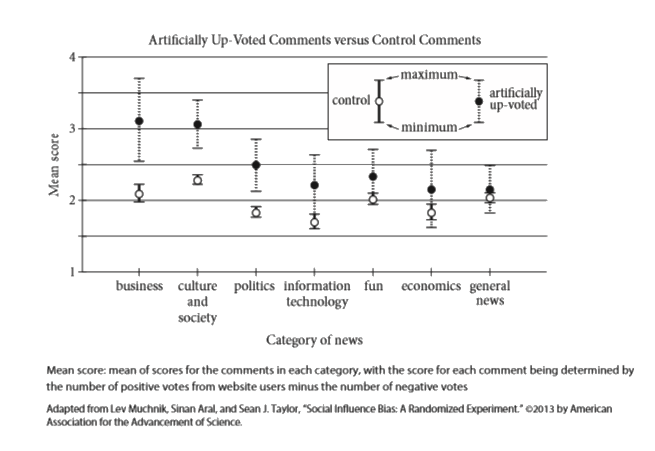
As used in line 85,"boost"most nearly meansAincreaseBaccelerateCpromoteDprotect
Find the number of ways in which 22 different books can be given to 5 students, so that two students get 5 books each and all the remaining students get 4 books each.
View SolutionThe 'wisdom of crowds" has become a mantra of the Internet age. Need to choose a new vacuum cleaner? Check out the reviews on online merchant Line Amazon. But a new study suggests that such online s scores don't always reveal the best choice. A massive controlled experiment of Web users finds that such ratings are highly susceptible to irrational "herd behavior' —and that the herd can be manipulated. Sometimes the crowd really is wiser than you. The to classic examples are guessing the weight of a bull or the number of gumballs in a jar. Your guess is probably going to be far from the mark, whereas the average of many people's choices is remarkably close to the true number. 15 But what happens when the goal is to judge something less tangible, such as the quality or worth of a product? According to one the, the wisdom of the crowd still holds—measuring ihe aggregate of people's opinions produces a stable, reliable 20 value, Skeptics, however, argue that people's opinions are easily swayed by those of others. So nudging a crowd early on by presenting contrary opinions—for example, exposing them to some very good or very bad attitudes—will steer the crowd in a 15 different direction. To test which hypothesis is true, you would need to manipulate huge numbers of people, exposing them to false information and determining how it affects their opinions. A team led b-y Sinan Aral, a network scientist at 30 the Massachusetts institute .of Technology in Cambridge, did exactly t lee Aral has been secretly . working with a popular website that aggregates news stories. The website allows users to make comments about news stories and vote each other's comments 55 up or down. The vote tallies ale visible as a number next to each comment , and the position of the comments is chronological. (Stories on the site get an average of about ten comments and about three votes per comment.)It’s a follow-up to his experiment using people’sratings of movies to measure how much individual people influence each other online (answer:alot).This time,he wanted to know how much the crowd influences the individual,and whether it can be controlled from outside.
For five months,every comment submitted by a user randomly received an“up”vote(positive),a “down”vote(negative),or as a control,no vote at all The team then observes! how users rated those comments. The users generated more than so 100,000 comments that were viewed more than 10 million times and rated more than 300,000 times by other users.
At least when it comes to comments on news sites, the crowd is more herdlike than wise. 55 Comments that received fake positive votes from the researchers were 32% more Likely to receive more positive votes compared with a control, the team reports. And those comments were no more likely than the control to be down-voted by the next viewer 60 to see them. By the end of the study, positively manipulated comments got an overall boost of about 25%. However, the same did not hold true for negative manipulation. The ratings of comments that got a fake down vote were usually negated by an up vote by the next user to see them. "Our experiment does not reveal the psychology behind people's decisions," Aral says, "but an intuitive explanation is that people are more skeptical of negative social influence. They're more 70 willing to go along with positive opinions from other people." - • -Duncan Watts, a network scientist at Microsoft Research in New York City, agrees with that conclusion. But] one question is whether the 75 positive 'herding] bias is specific to this site" or true in general, Watts says. lie points out that the category of the news items in the experiment had a strong effect on how much people could be manipulated. "I would have thought that 'business' is so pretty similar to 'economics,' yet they find a much stronger effect (almost 50% stronger) for the former • than the latter. What explains this difference? If we're going to apply these findings in the real world, we'll need to know the answers.Will companies be able to boost their products by manipulating online ratings on a massive scale? “That is easier said than done,”Wattssays.If people detect—or learn—that comments on a website are being manipulated,the herd may spook and leave entirely.
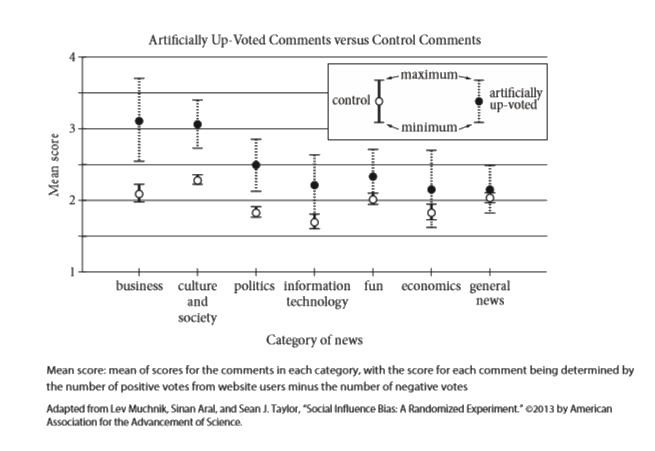
Which action would best address a question watts raises about the study?View SolutionThe 'wisdom of crowds" has become a mantra of the Internet age. Need to choose a new vacuum cleaner? Check out the reviews on online merchant Line Amazon. But a new study suggests that such online s scores don't always reveal the best choice. A massive controlled experiment of Web users finds that such ratings are highly susceptible to irrational "herd behavior' —and that the herd can be manipulated. Sometimes the crowd really is wiser than you. The to classic examples are guessing the weight of a bull or the number of gumballs in a jar. Your guess is probably going to be far from the mark, whereas the average of many people's choices is remarkably close to the true number. 15 But what happens when the goal is to judge something less tangible, such as the quality or worth of a product? According to one the, the wisdom of the crowd still holds—measuring ihe aggregate of people's opinions produces a stable, reliable 20 value, Skeptics, however, argue that people's opinions are easily swayed by those of others. So nudging a crowd early on by presenting contrary opinions—for example, exposing them to some very good or very bad attitudes—will steer the crowd in a 15 different direction. To test which hypothesis is true, you would need to manipulate huge numbers of people, exposing them to false information and determining how it affects their opinions. A team led b-y Sinan Aral, a network scientist at 30 the Massachusetts institute .of Technology in Cambridge, did exactly t lee Aral has been secretly . working with a popular website that aggregates news stories. The website allows users to make comments about news stories and vote each other's comments 55 up or down. The vote tallies ale visible as a number next to each comment , and the position of the comments is chronological. (Stories on the site get an average of about ten comments and about three votes per comment.)It’s a follow-up to his experiment using people’sratings of movies to measure how much individual people influence each other online (answer:alot).This time,he wanted to know how much the crowd influences the individual,and whether it can be controlled from outside.
For five months,every comment submitted by a user randomly received an“up”vote(positive),a “down”vote(negative),or as a control,no vote at all The team then observes! how users rated those comments. The users generated more than so 100,000 comments that were viewed more than 10 million times and rated more than 300,000 times by other users.
At least when it comes to comments on news sites, the crowd is more herdlike than wise. 55 Comments that received fake positive votes from the researchers were 32% more Likely to receive more positive votes compared with a control, the team reports. And those comments were no more likely than the control to be down-voted by the next viewer 60 to see them. By the end of the study, positively manipulated comments got an overall boost of about 25%. However, the same did not hold true for negative manipulation. The ratings of comments that got a fake down vote were usually negated by an up vote by the next user to see them. "Our experiment does not reveal the psychology behind people's decisions," Aral says, "but an intuitive explanation is that people are more skeptical of negative social influence. They're more 70 willing to go along with positive opinions from other people." - • -Duncan Watts, a network scientist at Microsoft Research in New York City, agrees with that conclusion. But] one question is whether the 75 positive 'herding] bias is specific to this site" or true in general, Watts says. lie points out that the category of the news items in the experiment had a strong effect on how much people could be manipulated. "I would have thought that 'business' is so pretty similar to 'economics,' yet they find a much stronger effect (almost 50% stronger) for the former • than the latter. What explains this difference? If we're going to apply these findings in the real world, we'll need to know the answers.Will companies be able to boost their products by manipulating online ratings on a massive scale? “That is easier said than done,”Wattssays.If people detect—or learn—that comments on a website are being manipulated,the herd may spook and leave entirely.
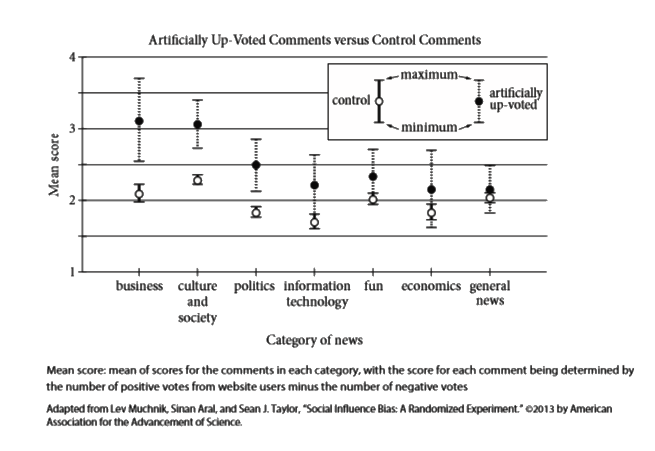
In the figure, which category of news have an artifically up-voted mean square of 2.5?View SolutionThe 'wisdom of crowds" has become a mantra of the Internet age. Need to choose a new vacuum cleaner? Check out the reviews on online merchant Line Amazon. But a new study suggests that such online s scores don't always reveal the best choice. A massive controlled experiment of Web users finds that such ratings are highly susceptible to irrational "herd behavior' —and that the herd can be manipulated. Sometimes the crowd really is wiser than you. The to classic examples are guessing the weight of a bull or the number of gumballs in a jar. Your guess is probably going to be far from the mark, whereas the average of many people's choices is remarkably close to the true number. 15 But what happens when the goal is to judge something less tangible, such as the quality or worth of a product? According to one the, the wisdom of the crowd still holds—measuring ihe aggregate of people's opinions produces a stable, reliable 20 value, Skeptics, however, argue that people's opinions are easily swayed by those of others. So nudging a crowd early on by presenting contrary opinions—for example, exposing them to some very good or very bad attitudes—will steer the crowd in a 15 different direction. To test which hypothesis is true, you would need to manipulate huge numbers of people, exposing them to false information and determining how it affects their opinions. A team led b-y Sinan Aral, a network scientist at 30 the Massachusetts institute .of Technology in Cambridge, did exactly t lee Aral has been secretly . working with a popular website that aggregates news stories. The website allows users to make comments about news stories and vote each other's comments 55 up or down. The vote tallies ale visible as a number next to each comment , and the position of the comments is chronological. (Stories on the site get an average of about ten comments and about three votes per comment.)It’s a follow-up to his experiment using people’sratings of movies to measure how much individual people influence each other online (answer:alot).This time,he wanted to know how much the crowd influences the individual,and whether it can be controlled from outside.
For five months,every comment submitted by a user randomly received an“up”vote(positive),a “down”vote(negative),or as a control,no vote at all The team then observes! how users rated those comments. The users generated more than so 100,000 comments that were viewed more than 10 million times and rated more than 300,000 times by other users.
At least when it comes to comments on news sites, the crowd is more herdlike than wise. 55 Comments that received fake positive votes from the researchers were 32% more Likely to receive more positive votes compared with a control, the team reports. And those comments were no more likely than the control to be down-voted by the next viewer 60 to see them. By the end of the study, positively manipulated comments got an overall boost of about 25%. However, the same did not hold true for negative manipulation. The ratings of comments that got a fake down vote were usually negated by an up vote by the next user to see them. "Our experiment does not reveal the psychology behind people's decisions," Aral says, "but an intuitive explanation is that people are more skeptical of negative social influence. They're more 70 willing to go along with positive opinions from other people." - • -Duncan Watts, a network scientist at Microsoft Research in New York City, agrees with that conclusion. But] one question is whether the 75 positive 'herding] bias is specific to this site" or true in general, Watts says. lie points out that the category of the news items in the experiment had a strong effect on how much people could be manipulated. "I would have thought that 'business' is so pretty similar to 'economics,' yet they find a much stronger effect (almost 50% stronger) for the former • than the latter. What explains this difference? If we're going to apply these findings in the real world, we'll need to know the answers.Will companies be able to boost their products by manipulating online ratings on a massive scale? “That is easier said than done,”Wattssays.If people detect—or learn—that comments on a website are being manipulated,the herd may spook and leave entirely.
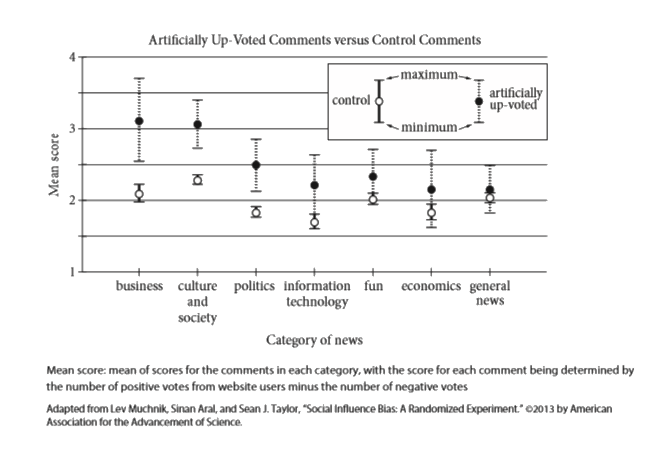
As used in line 86,"Scale" most nearly meansView SolutionThe 'wisdom of crowds" has become a mantra of the Internet age. Need to choose a new vacuum cleaner? Check out the reviews on online merchant Line Amazon. But a new study suggests that such online s scores don't always reveal the best choice. A massive controlled experiment of Web users finds that such ratings are highly susceptible to irrational "herd behavior' —and that the herd can be manipulated. Sometimes the crowd really is wiser than you. The to classic examples are guessing the weight of a bull or the number of gumballs in a jar. Your guess is probably going to be far from the mark, whereas the average of many people's choices is remarkably close to the true number. 15 But what happens when the goal is to judge something less tangible, such as the quality or worth of a product? According to one the, the wisdom of the crowd still holds—measuring ihe aggregate of people's opinions produces a stable, reliable 20 value, Skeptics, however, argue that people's opinions are easily swayed by those of others. So nudging a crowd early on by presenting contrary opinions—for example, exposing them to some very good or very bad attitudes—will steer the crowd in a 15 different direction. To test which hypothesis is true, you would need to manipulate huge numbers of people, exposing them to false information and determining how it affects their opinions. A team led b-y Sinan Aral, a network scientist at 30 the Massachusetts institute .of Technology in Cambridge, did exactly t lee Aral has been secretly . working with a popular website that aggregates news stories. The website allows users to make comments about news stories and vote each other's comments 55 up or down. The vote tallies ale visible as a number next to each comment , and the position of the comments is chronological. (Stories on the site get an average of about ten comments and about three votes per comment.)It’s a follow-up to his experiment using people’sratings of movies to measure how much individual people influence each other online (answer:alot).This time,he wanted to know how much the crowd influences the individual,and whether it can be controlled from outside.
For five months,every comment submitted by a user randomly received an“up”vote(positive),a “down”vote(negative),or as a control,no vote at all The team then observes! how users rated those comments. The users generated more than so 100,000 comments that were viewed more than 10 million times and rated more than 300,000 times by other users.
At least when it comes to comments on news sites, the crowd is more herdlike than wise. 55 Comments that received fake positive votes from the researchers were 32% more Likely to receive more positive votes compared with a control, the team reports. And those comments were no more likely than the control to be down-voted by the next viewer 60 to see them. By the end of the study, positively manipulated comments got an overall boost of about 25%. However, the same did not hold true for negative manipulation. The ratings of comments that got a fake down vote were usually negated by an up vote by the next user to see them. "Our experiment does not reveal the psychology behind people's decisions," Aral says, "but an intuitive explanation is that people are more skeptical of negative social influence. They're more 70 willing to go along with positive opinions from other people." - • -Duncan Watts, a network scientist at Microsoft Research in New York City, agrees with that conclusion. But] one question is whether the 75 positive 'herding] bias is specific to this site" or true in general, Watts says. lie points out that the category of the news items in the experiment had a strong effect on how much people could be manipulated. "I would have thought that 'business' is so pretty similar to 'economics,' yet they find a much stronger effect (almost 50% stronger) for the former • than the latter. What explains this difference? If we're going to apply these findings in the real world, we'll need to know the answers.Will companies be able to boost their products by manipulating online ratings on a massive scale? “That is easier said than done,”Wattssays.If people detect—or learn—that comments on a website are being manipulated,the herd may spook and leave entirely.
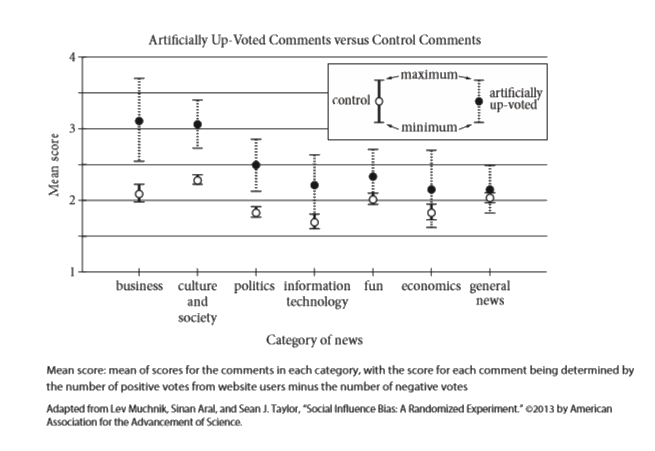
Which choice best supports the view of the "skeptics" (line 20)?View Solution

